My Mother
My mother, Lamberdina Carolina Maria van Hoesel, was born in Apeldoorn, the Netherlands, on the 27th of July 1907. She was the eldest of nine children. The family lived in abject poverty, because her father, who served as a teacher at the local Catholic primary school, only enjoyed a very meagre salary.
Childhood years
My mother told me many poignant stories about early hardships. Dutch Catholic parishes at the time had to survive without external financial support. So to raise money, the pews in church were ‘leased out’ once a year to the highest bidders, that is: front rows to the richest parishioners. Since her parents were so poor, they could only pay for the cheapest places: four seats at the back of church behind pillars without a view of the high altar. To go to Mass on Sundays, the family had to split into three sections each needing to attend Mass at different times, to enjoy their four seats behind pillars, of course.
Trouble also at school. The children needed to ask their classmates for the loan of textbooks because they could not afford the 10-cent cost of the textbooks themselves. At times, my mother told me, the five oldest children would walk to school together, sharing just one sweet between them which they had been given by an aunt. The avenue leading to the school had trees on both sides, so the manner they worked out their sharing is that each could suck the sweet during the walk from one tree to the next, then pass it on to his or her neighbour.
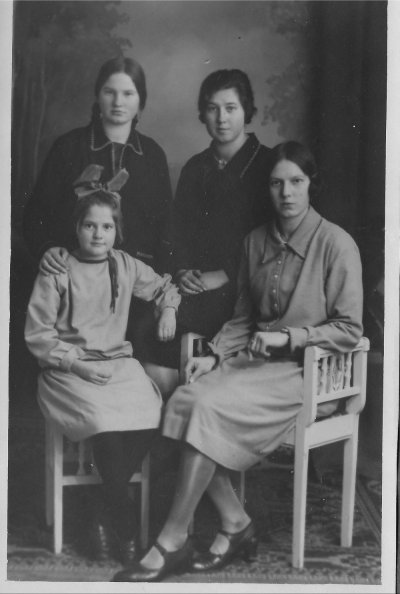
Mother, seated right, with sisters (top row) Bep en Carolien, (front row) Nel.
My mother was a keen and intelligent student. One day, at an essay competition, she came out on top of her class. The teacher, a religious sister, was delighted and awarded her with a precious gift: a large porcelain doll, fully dressed and with long blond hair. “Incredible!”, my mother told me. “I had never had a toy like that. I carefully carried the doll home, but once in the house my sisters wanted to kiss and fondle the doll too. Then the disaster happened. My sister Caroline dropped the doll on the ground – it broke its skull. It was the end of a dream.”
Hair styling for the girls was done at home, to reduce costs. The boys were sent to a barber but only to be totally shaved bald. It was the lowest price and lasted the longest.
The wider family was also poor. One story my mother recounted to me was that she visited her aunt who was married to a tailor. Since the pre-war recession prevailed, business was low. The tailor had not had a good commission for weeks and food for the family was running low. Then, while my mother was still with my aunt and her children in their living room, a customer entered the tailor’s shop next door. He looked like a well-to-do man . . . My aunt and her children fell on their knees before a statue of Christ in the corner of the room. “Please, Jesus, please”, my aunt pleaded with tears in her eyes. “Let him order a whole suit! Please!”
One consequence of the family’s lack of means was that while the boys were sent for higher education, mainly at teachers’ training colleges which were the most affordable, the girls were only allowed to attend a minimum of secondary school. My mother made up for it in many ways. She finished a course as a seamstress so that she could make blouses and shirts on the family sewing machine. Under private tuition by one of her uncles, called ‘Frans’, she studied French, German and English She also obtained a diploma in Esperanto, which in those days was considered the world language of the future.
Being the eldest of the nine children my mother shared many of the agonies and worries of her own mother. Matters were not helped by the fact that her father suffered from serious morning sickness. At breakfast he would shout and complain and terrorize everyone. “It was a relief when he had picked up his bike and cycled off to his school”, my mother used to tell me. Later on during the day the man was more gentle and helpful. Which was not always easy with such a large family.
My mother also shared with me an amusing story about one incident that happened when the whole family of eleven were gathered round the long dining table at lunch. My grandmother, at one head of the table, had just begun to ladle out soup on plates that were handed round. A few of the younger boys quarreled. My grandfather, at the other end of the table, grew annoyed about this. He lifted up his spoon, slapped it on the table and wanted to shout “Stop!” – which in Dutch, like in English, means “stop!”. However instead, he shouted “Poep!” – pronounced ‘poop’ which means “shit” in Dutch. Because he was a rather prudish man, this was an utter surprise. My grandmother and the children looked at him in amazement, then, seeing his embarrassment, burst out in laughter. Some rolled on the floor, others clapped their hands. My grandfather, with a red face, just shook his head . . .
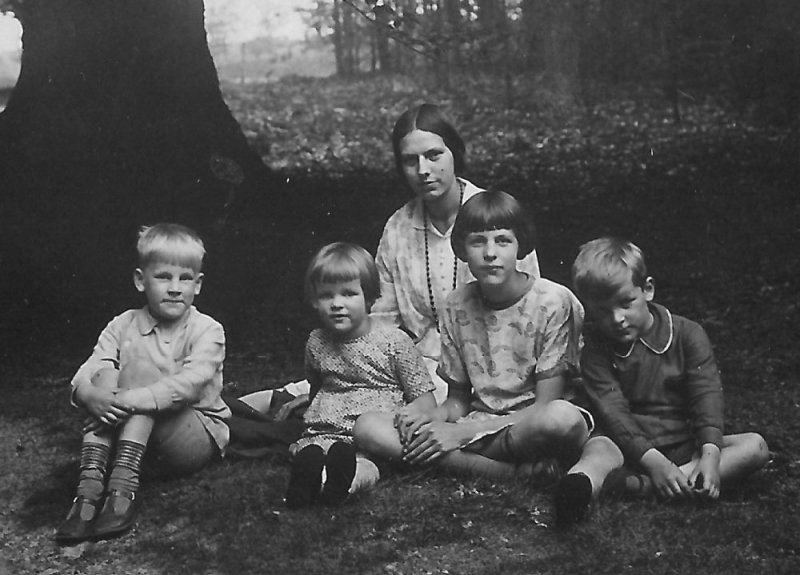
Mother with the four Bronkhorst children
As my mother became twenty, through contacts she got an interesting job. She became a ‘governess’, a tutor, to the children of a rich family, the Bronkhorsts, who lived in a spacious mansion.
Finding a partner
My mother did not look forward to getting married, my mother once confided to me. Basically she doubted whether she would ever meet a man she could get on with. Then the miracle happened: she met my father.
The first encounter did not have an auspicious start. My mother and father were both part of a small group of youngsters who were out on a cycle trip through the hilly forests around Apeldoorn. When having to climb a steep slope, all came off their bicycles pushing them uphill on foot. My father maneuvered himself next to my mother and said to her: “Let me help you. I can push your bike as well.”
“Nonsense!”, my mother replied. “I don’t need your help!”
My father told me afterwards: “From the moment I saw her during that trip I fell in love with her. I knew she was the right partner for me.” So he kept walking next to her and soon they were talking. At the time my father was just finishing his teachers’ training programme in Hilversum. At the end of the trip they decided they would meet again . . . To do this, my father would cycle during weekends from the hostel where he was boarding in Hilversum to my mother’s home in Apeldoorn.
My parents’ meetings and discussions proved very fruitful. They gelled. My father soon discovered how ill-informed my mother was about sex and marriage. He provided her with booklets which she would read in private, away from the prudish control of her own father. My parents made up their minds to get married. Just in time for a major development. For my father, who had obtained his headteacher’s certificate and who could not find a job in the Netherlands, was suddenly offered employment in the Dutch East Indies.
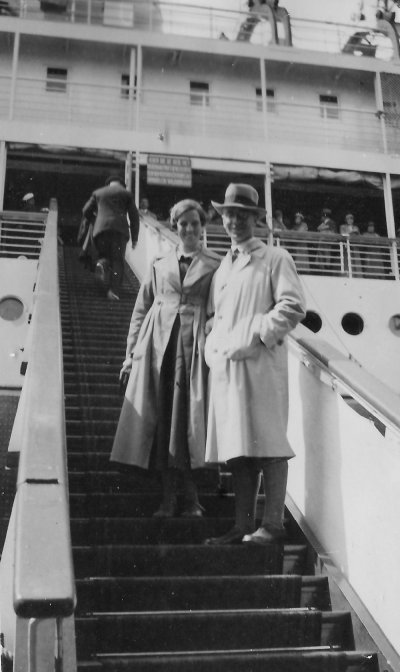
My parents boarding the ship for Indonesia
It meant arranging a wedding in record time. Then preparing for the unpredictable journey to ‘the adventure in Indonesia’ as my mother used to call it. My mother also told me that, when my father proposed to her, she told him that she would marry him on one condition. Because of her inborn fear of spiders she told him: “You must promise to catch any spider we may come across and get rid of it without further question.”
“Agreed”, my father replied. “But I also have a condition.”
“What condition?”, my mother asked.
“That when we sit together in the evenings you will not darn socks as my own mother and sisters would always do.”
“With pleasure!”, my mother replied.
In May 1933 they were married. A week later they boarded a ship leaving for the Dutch East Indies.
More information on my mother’s family can be found in this album ‘Van Hoesel’. Images of my parents’ early history are recorded in ‘The Netherlands 1911-1933’.
Indonesia
My father’s first appointment in Indonesia was as headmaster of a new primary school in Sragen, a small town near Surakarta, Central Java. My mother had great difficulties adjusting to the new country. The hot and humid climate did not agree with her at all. Also, she disliked the food. This was partly due, as she explained to me later, by a trick played on my parents by another Dutch couple they met in Sragen. They arranged for an Indonesian meal for my parents but purposely, by way of a joke (!), they saw to it that all the dishes were heavily spiced with green pepper – an overdose of sambal oelek. It put my mother off Indonesian dishes for years, until she discovered they don’t need to be made so pedis – so pungent.
In 1935 my father transferred from Government educational service to Catholic mission service. This brought a new appointment. He became head of two primary schools in Surabaya, one Dutch speaking, one Malay speaking.
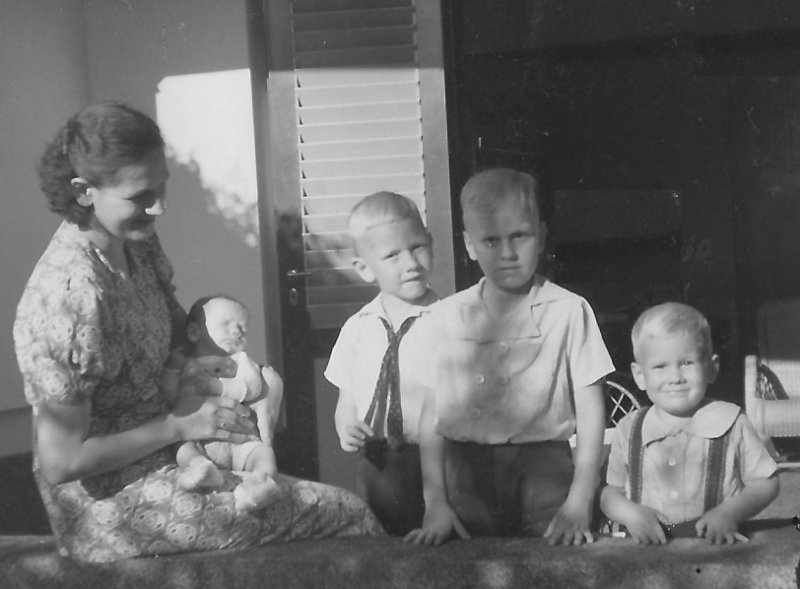
Mother with her four sons: (l.t.r) Aloys, myself, Carel, Niek, just before we entered the camp
In spite of all her physical handicaps, my mother proved a fortress of strength when World War II started in Indonesia. She safely guided myself and my three brothers through our 4 ½ years’ stay in Japanese prisoner-of-war camps. You can read the story at length in previous chapters: ‘Into gaping jaws’ and ‘From the pincers of death’.
Equality for women
As my mother grew up she became more and more aware of the many social prejudices against women. She deeply resented every form of discrimination against women that she encountered. She was determined to fight any form of bias she came across.
I have already recounted how she refused to be ‘churched’ when I was born. Women were considered unclean after childbirth. They could only re-enter the church after they had been re-admitted by a priest through a small ritual which was called ‘churching’. My mother insisted she should receive holy communion the day after I had been born. She made sure she was present when I was baptised in the local hospital chapel that same day. Read the full story here: ‘Origins’.
Another incident happened around the same time. Remember, my father was headmaster of a mission school in Surabaia and my mother sat on the board of the adjoining girls’ school. My parents also prepared people for Mass on Sunday in one of the school’s classrooms. One day the parish priest came to visit them and announced: “I received a new chalice from Holland!” He produced it from his bag and put it triumphantly on the table. My mother lifted it up, to admire it more closely.
“My God! Mrs. Wijngaards, what are you doing!” the parish priest called out.
“Doing what?” my mother asked.
“This is a sacred vessel. No woman may touch it!”
“I sank through the ground”, my mother would tell me later a dozen times. “I felt hurt, humiliated, angry. Why should I be kept from touching a sacred object just because I’m a woman? Am I so dirty or profane?” She only put the chalice down after having scrutinised it carefully. She was furious. Rightly so!
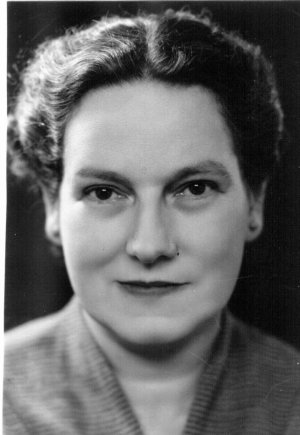
Another interesting event happened years later in Nijmegen, where my father was teaching in the Teachers’ Training College.
As daily mass-goers, my parents would frequent the chapel of a nearby monastery of Franciscans. They became great friends of the local community.
One evening Professor Dr. Lucas Brinkhof OFM came to visit them. He was a member of the international Vatican Commission for Liturgical Renewal. Liturgical reforms were slowly taking place. In those days, the priest at Mass was still turned to the tabernacle rather than facing the community. At the offertory he would turn around and say: “Orate Fratres” – “Pray Brothers”.Now a new Dutch translation of the Mass had been approved. And at the offertory the priest would now say: “Bidt Broeders” = ‘pray brothers’ in Dutch.My mother took exception to that. She challenged Brinkhof.”If you say ‘bidt broeders’,” my mother said, “you do not include women!” Brinkhof defended the translation by saying that the expression “brothers” liturgically included women. “Nonsense!”, my mother retorted. “We are talking about the Dutch language we speak today. I am not a ‘broeder’ (brother), ik ben een ‘zuster’ (sister).” They could not come to an agreement. My father told me afterwards that he had felt embarrassed that my mother dared to challenge a renowned professor as strongly as she did.A few days later, Mother was there when Brinkhof was saying Mass. At the offertory, he turned around to face the congregation, ready to say “bidt broeders!”. But when he saw my mother sitting in the front row, his face turned red, he stammered and could not get the “pray brothers” over his lips . . .Was it a coincidence that a few months later the Liturgical Commission issued an instruction for the whole world that explicitly stated that vernacular translations should be gender inclusive? Both men and women should be addressed in liturgical appeals. In Dutch the text now read: “Bidt broeders en zusters!” I believe my mother played a part in bringing about this positive change.
Again, years later when my father had already died and my mother lived in another parish, she attended Sunday Mass. The parish priest, in his homily, commented on Ephesians 5,22-33 and stressed that, as Paul commands, ‘wives should be submissive to their husbands’. My mother rang the priest afterwards and expressed his disagreement. When the priest remonstrated, she demanded that he visit her in her home. They had a long argument, but she did not give in. “That’s how women were treated in the past”, my mother kept saying. “It’s not how it should be today, especially among Christians.”
In all this my mother displayed a perfect example of the ‘sensus catholicus’, ‘the correct Catholic understanding’. In spite of her never having had the chance to study theology, she knew, as a believing person, the true values contained in the Gospel, in Jesus’ vision. Full equality for women was, she knew, one of those values.
My mother’s love
In spite of her being clear-headed and tough, my mother’s vision was always one kindness, caring and love. She treasured being with Father. Rather than going out to parties at night, my parents preferred quiet evenings together. Mother had the gift of foresight organization. She was able to look ahead and was never afraid to take tough steps. Father sometimes said: “You should have become the mother of a large monastery or manager of an international hotel.” This sounded as a joke, but it also expressed admiration. At many critical moments, Mother helped Father immeasurably by drastically intervening.When the publisher Het Gregoriushuis sent back the manuscript of father’s Textbook on the History of Art – ‘Kunstgeschiedenis’ – with negative reviews, Mother received the parcel. The cover letter said: “What qualification has the author to write on such a wide-ranging topic?” My mother was angry. She knew it would upset and depress father. So she took matters in her own hands.Before father returned from college, she sent the three-volume manuscript with a covering letter to another, larger publisher: Malmberg in Den Bosch. When father came home, he groaned. “Let’s hope it will work! Perhaps I should I have made some improvements to the text . . .”A few weeks later a representative came to talk to my father. My mother was present too. The agent confirmed that the publisher was interested. And then the haggling started.“Since this is the history of art is a new topic for schools, this book can only be published on an experimental basis. We normally give our authors a 10% royalty on sales achieved. Since this book is so uncertain, we can only offer 8%.”“Well”, father said, scratching his right ear. “If that is so . . .”My mother jumped in. “No, we can’t accept an 8% royalty for the whole publication”, she said. “The book is worth more. But if you are so uncertain about sales, we will be content with 8% on the first 3000 copies sold. After that you should pay 10%!”The agent hummed and ha’d, but finally agreed. My father’s comment to my mother after the agent left was: “I don’t know how you dare to bargain like that. But thank you. We have won!”The book was published. It was welcomed with open arms in schools all over the Netherlands. It enjoyed fourteen editions amounting to the sale of tens of thousands of copies.
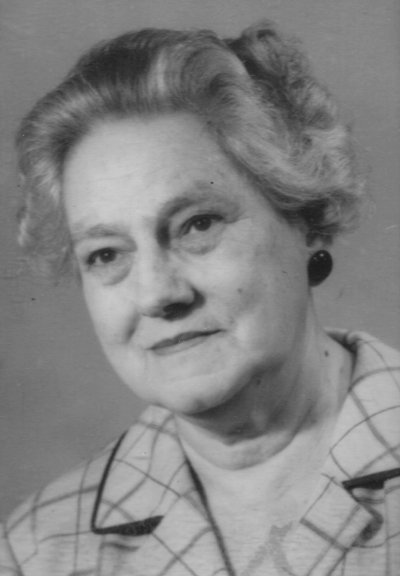
Mother lived for her family. Among her brothers and sisters, she remained the oldest, concerned about everyone’s woe and woe. She cared very much about her children and grandchildren. She always said, “I love all of my children and grandchildren equally. I have no favourites.” She often said: “I know I am not the easiest. That is why I am so happy that I am in such good contact with everyone.” Mother meant that and often spoke about it. “What do I live for if not to see those I love to be happy and to share their happiness?” Mother’s satisfaction and joy about the family was one of the reasons why she was ready to die. Mother possessed a deep and personal religious belief. God was important in her life and she converted her relationship with him into practical spiritual values. When looking for a house in Utrecht, and later in Nijmegen, the proximity of a church was a decisive factor. She wanted to make sure it was close enough for her to attend daily mass. Mother was concerned with theology. She fully supported the Second Vatican Council because, according to her, contemporary innovations bring out the essence of faith better.Mother loved wide views. She enjoyed scientific documentaries, whether they were about antiquity, investigations in the universe or discoveries in the jungles of Brazil. And that brought her to God. When she got older, she revealed a poetic streak. Once, walking with her in the woods near her retirement home Rennen Enk, she pointed out favourite spots to me: “See, I call this tree the Puist [= the clenched fist]. And that is the Knuffel [= hugging doll] – I often see a squirrel lurking around a branch. And look at those stones. This is just like a baby’s cradle, and that like a ship. What a miracle the world is!”
Mother died in July 1989. She is remembered with love by her children and grandchildren.
You will find photo galleries with images about mother here.
THE STORY OF MY LIFE
- » FOREWORD
- » Part One. LEARNING TO SURVIVE
- » origins
- » into gaping jaws
- » from the pincers of death
- » my father
- » my mother
- » my rules for survival
- » Part Two. SUBMIT TO CLERICAL DOGMA — OR THINK FOR MYSELF?
- » seeking love
- » learning to think
- » what kind of priest?
- » training for battle
- » clash of minds
- » lessons on the way to India
- » Part Three (1). INDIA - building 'church'
- » St John's Seminary Hyderabad
- » Andhra Pradesh
- » Jyotirmai – spreading light
- » Indian Liturgy
- » Sisters' Formation in Jeevan Jyothi
- » Helping the poor
- » Part Three (2). INDIA – creating media
- » Amruthavani
- » Background to the Gospels
- » Storytelling
- » Bible translation
- » Film on Christ: Karunamayudu
- » The illustrated life of Christ
- » Part Three (3). INDIA - redeeming 'body'
- » spotting the octopus
- » the challenge
- » screwed up sex guru
- » finding God in a partner?
- » my code for sex and love
- » Part Four. MILL HILL SOCIETY
- » My job at Mill Hill
- » The future of missionary societies
- » Recruitment and Formation
- » Returned Missionaries
- » Brothers and Associates
- » Part Five. HOUSETOP LONDON
- » Planning my work
- » Teaching teaching
- » Pakistan
- » Biblical Spirituality
- » Searching God in our modern world
- » ARK2 Christian Television
- » Part Five (2) New Religious Movements
- » Sects & Cults
- » Wisdom from the East?
- » Masters of Deception
- » Part Five (3). VIDEO COURSES
- » Faith formation through video
- » Our Spirituality Courses
- » Walking on Water
- » My Galilee My People
- » Together in My Name
- » I Have No Favourites
- » How to Make Sense of God
- » Part Six (1). RESIGNATION
- » Publicity
- » Preamble
- » Reaction in India
- » Mill Hill responses
- » The Vatican
- » Part 6 (2). JACKIE
- » childhood
- » youth and studies
- » finding God
- » Mission in India
- » Housetop apostolate
- » poetry
- » our marriage
